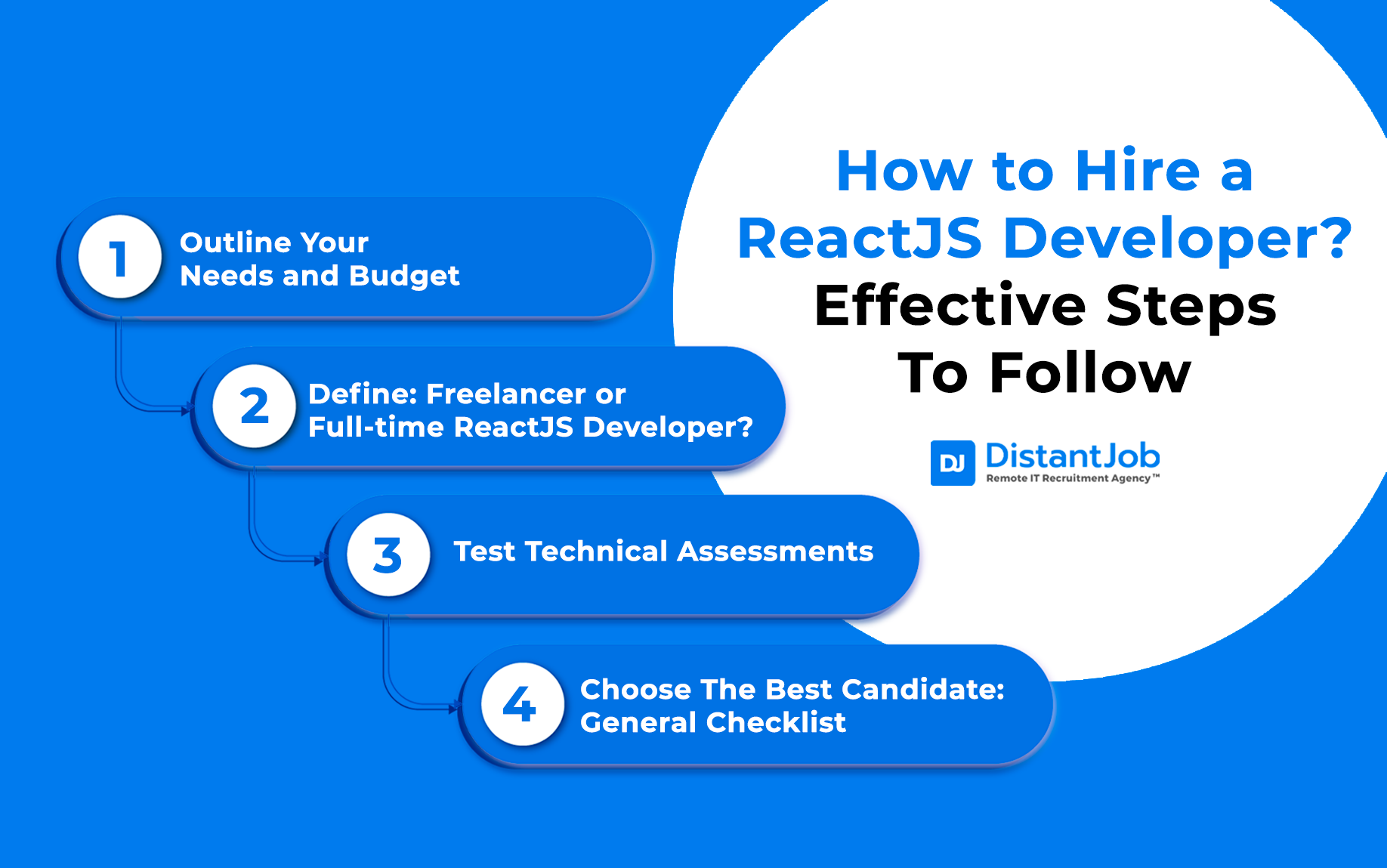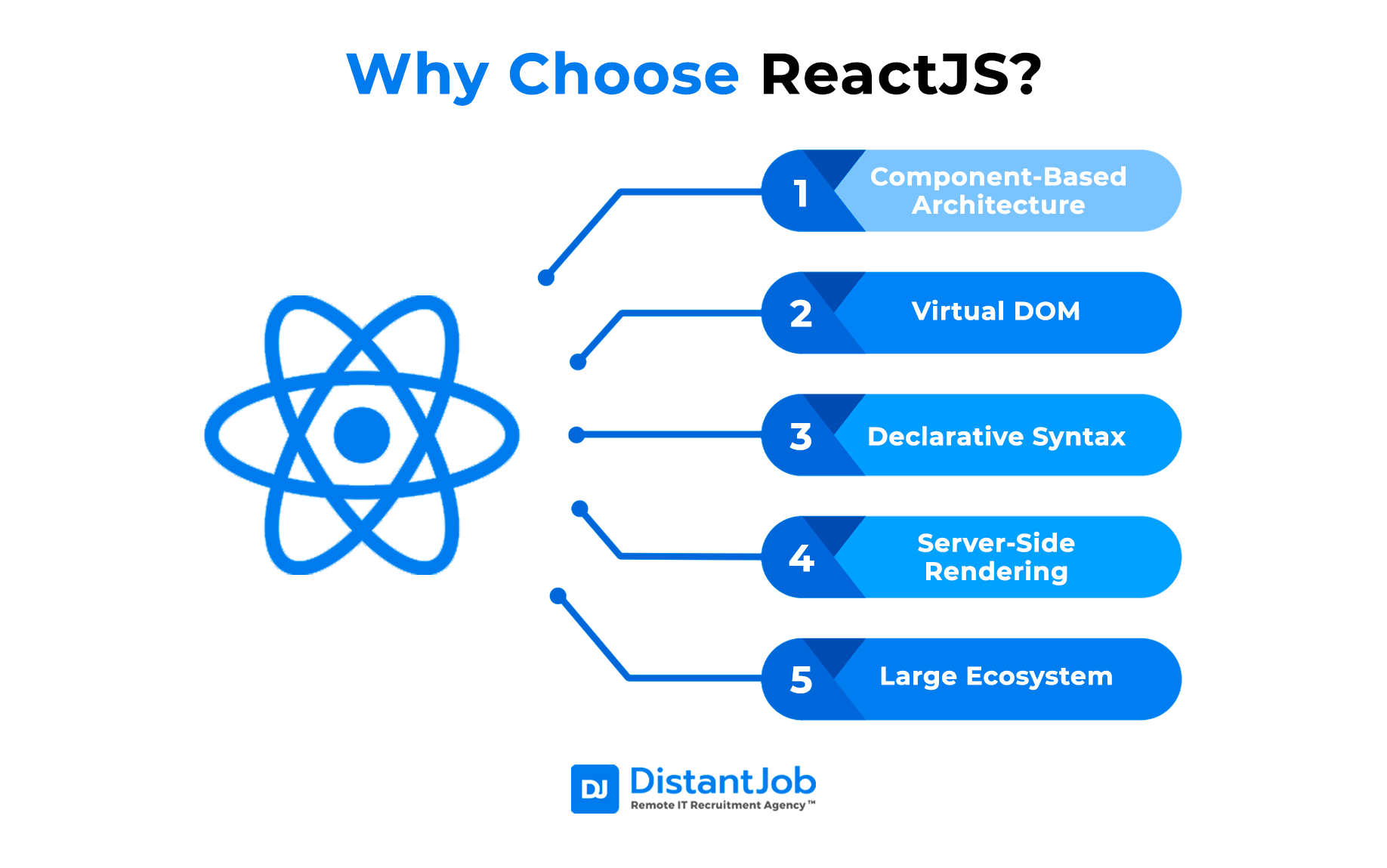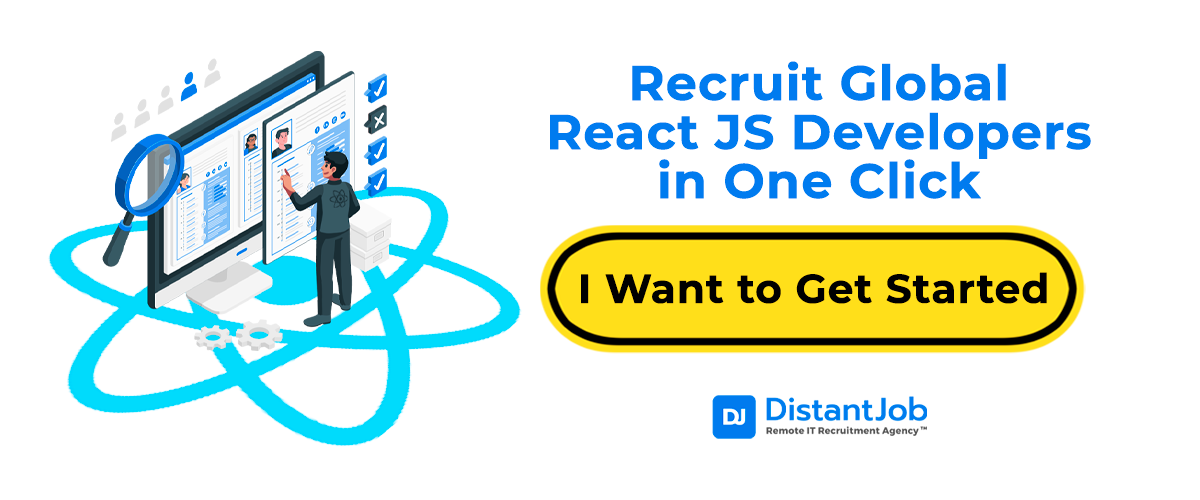Why Eastern Europe? Simply because it has rapidly emerged as a hub for tech talent, particularly in software development. The region boasts a high concentration of skilled developers driven by a strong educational foundation and a vibrant tech ecosystem. For instance, Poland and Ukraine are among the top countries in the region, each with substantial numbers of developers specializing in various technologies, including React.
Hiring React developers in Eastern Europe is not only about accessing skilled talent but also about benefiting from cost efficiencies that are hard to match in Western Europe or North America.
In this guide, we have outlined the key skills to consider, simple steps on how to hire your next ReactJS developer, and added a sample test to help assess your new hire. Let’s dive in.
Key Skills and Experience to Look for in a React Developer
When hiring a React developer, it’s essential to look for strong technical proficiency in JavaScript, HTML, CSS, and modern JavaScript frameworks like React. A good candidate should have a deep understanding of React’s component-based architecture, state management, and lifecycle methods.
Here are the key ones to look for:
- Writing clean, efficient, and maintainable code using ReactJS and related technologies like Redux, GraphQL, and Webpack.
- Collaborating with designers to implement UI designs and ensure a consistent look and feel across the application.
- Integrating with APIs and backend systems to fetch and display data in the UI.
- Writing automated tests to ensure the application works as expected and is free of bugs.
- Optimizing the application for performance, scalability, and accessibility.
- Staying up-to-date with new ReactJS features and trends in the web development industry.
When it comes to skills, these will depend on their experience level. Junior ReactJS developers usually are proficient in ReactJS but lack familiarity with testing frameworks.
Here´s a table overview of the ReactJS developer skills based on their experience:
| Skills | Junior ReactJS Developer | Mid-Level ReactJS Developer | Senior ReactJS Developer |
| Core ReactJS Skills | |||
| Understanding of ReactJS fundamentals (e.g., components, state, props) | Yes | Yes | Yes |
| Familiarity with React hooks and context API | No | Yes | Yes |
| Knowledge of React Router for client-side routing | No | Yes | Yes |
| JavaScript Skills | |||
| Proficiency in JavaScript, including ES6+ features | |||
| Understanding of functional programming principles | No | Yes | Yes |
| Familiarity with popular JavaScript libraries and frameworks (e.g. jQuery, Angular, Vue) | No | No | Yes |
| Front-end Web Development Skills | |||
| Knowledge of HTML and CSS, including preprocessors (e.g., Sass, Less) | Yes | Yes | Yes |
| Familiarity with CSS frameworks (e.g. Bootstrap, Foundation) | No | Yes | Yes |
| Understanding of responsive design and cross-browser compatibility | Yes | Yes | Yes |
| Back-end Web Development Skills | |||
| Familiarity with RESTful APIs and GraphQL | No | Yes | Yes |
| Understanding of server-side rendering and next.js | No | No | Yes |
| Knowledge of Node.js and server-side JavaScript | No | No | Yes |
| Other Skills | |||
| Familiarity with Git and version control | Yes | Yes | Yes |
| Experience with testing frameworks (e.g., Jest, Enzyme) | No | Yes | Yes |
| Familiarity with build tools (e.g., Webpack, Babel) | No | Yes | Yes |
Hire a React Developer in 4 Simple Steps
When it comes to hiring a ReactJs developer, follow these four simple steps to ensure you have the top talent.

1. Outline Your Needs and Budget
Are you a medium-sized business that needs React.js because of its speed of developing user interfaces, stability, and reliability? Or a startup that needs it because it is ideal for application building?
Identifying your needs is the first step, mostly because of costs. If you are unclear about what specific requirements you need, you might end up with a bad hire which can have negative impacts on business operations and growth in the long term, making it difficult for you to sustain success.
Start by:
- Defining your project (be specific)
- What skill set does the project need?
- What requirements are negotiable?
- Which ones are non-negotiable?
- What is your budget?
- What are your deadlines?
- What are your expectations?
2. Define Freelancer or Full-time ReactJS Developer.
Are you looking for a freelance ReactJS developer for a short-term project? Or do you want a full-time ReactJS developer who is fully committed to your project in every step of the development process?
Both have advantages and disadvantages, but there are not the same. You need to have this in mind, as it can heavily impact the outcome of your project.
Overall, the decision to hire a freelance or full-time React developer depends on the project’s and organization’s specific needs.
Freelance developers offer more flexibility and expertise but come at a higher cost in the long term, while full-time developers offer stability and consistency, especially for complex applications.
3. Test Technical Assessments
A technical background and a clear understanding of their requirements are a must. Generalized interview questions and tests are the jackpots for developers who are not really good at what they do but want to land a job.
What we recommend: The best way to evaluate potential new hires is using project-based assessments. Technical assessments for ReactJS developers help evaluate their proficiency and problem-solving skills in working with the framework. You can observe their approach to problem-solving and gauge their ability to develop a plan of action to complete the task.
Here are some sample test ideas for ReactJS developers:
| Test | |
| Building a simple React component | Give candidates a task to create a basic React component from scratch. This helps evaluate their understanding of JSX syntax, component structure, state management, and event handling. |
| Implementing a feature | Ask candidates to implement a specific feature in an existing React application or give them a mock-up or design for them to build the corresponding React components. Here you can asses their ability to translate requirements into functional React code. |
| State management and data handling | Give candidates a scenario that requires managing state and handling data flow within a React application. Ask them to design and implement the appropriate components and state management techniques, such as React hooks or Redux. |
| Debugging and troubleshooting | Provide candidates with a buggy React code snippet or a partially functional React application and ask them to identify and fix the issues. With this test, you´ll evaluate their ability to debug, troubleshoot, and resolve common React-related problems. |
| Performance optimization | Challenge candidates to optimize the performance of a React application. This involves identifying and implementing different strategies like code splitting, lazy loading, or memoization to improve rendering speed and optimize resource usage. |
| Testing React components | Assess candidates’ knowledge of React testing by asking them to write unit tests or integration tests for React components using testing libraries like Jest or React Testing Library. With this test, you’ll evaluate their ability to write effective tests and ensure component functionality. |
| React hooks and context API | Test candidates’ understanding and usage of React hooks and the context API. Present scenarios where these features can be utilized effectively and evaluate their ability to implement and manage hooks and context-based state management. |
4. General Checklist to Choose the Best Candidate
Once you have conducted technical assessments, make sure also to do a non-technical interview to get to know the candidate better.
Here´s a general checklist of the things you should keep an eye on when selecting the best candidate:
- Experience working with ReactJS: Look for developers who have experience working with ReactJS, furthermore, on projects similar to yours (Evaluate their proficiency with the framework, their understanding of React components, state management, and overall the React ecosystem)
- Knowledge of related technologies: Technologies such as Redux, GraphQL, and NodeJS are often used alongside ReactJS. Skilled developers should be familiar with these technologies and other tools.
- Portfolio: Reviewing a developer’s portfolio is the best way to evaluate their work and understand the type of projects they can manage. This will give you a practical understanding of their skills, experience, and potential.
- Communication skills: Communication and collaboration are key skills for good project outcomes.
- Problem-solving skills: The best ReactJS developers are those who can think outside the box and propose solutions to complex problems. The best way to evaluate this is by asking how they have overcome challenges in the past.
Culture fit: Developers who share your company values are more likely to work effectively with your team and be more committed and engaged with their work.
Finding the Right Developer
Finding the right React developer in Eastern Europe involves knowing where to find these developers.
When deciding on a platform to hire from, it is important to factor in your requirements and what resources you have available. Each platform has benefits and drawbacks, so it is essential to evaluate your individual needs before making a decision.
For example, if you need a dedicated, full-time developer, job postings or IT recruitment agencies are the perfect place to start your search. But, if you only need someone for a brief project, freelance platforms might be the ideal solution.
1. Social Media: Social platforms like Facebook, LinkedIn, Quora, and Twitter have many talented developers searching for jobs.
| Pros | Cons |
| Access to specialized communities. | You need time to headhunt, recruit, and interview. |
| Directly engage with potential candidates. | It can be challenging to verify credentials. |
| Review their portfolios. | Limited information (Depending on what candidates decide to share online). |
2. Freelancing Platforms: Upwork, PeoplePerHour, and Toptal are popular platforms for businesses looking to hire freelancers.
| Pros | Cons |
| You can check their previous work and references. | You still need to do the vetting and interviewing process. |
| It´s an affordable option. | Limited long-term commitment. |
| You can find developers with specialized skills. | Challenging to assess their quality and reliability. |
3. Local Recruitment Agencies: These organizations specialize in connecting businesses with job seekers in a specific geographic area.
| Pros | Cons |
| Save time and resources. | Their talent pool is reduced. |
| Have access to a wide network of potential candidates. | Focus on different niches (unless they specialize in the IT industry.) |
| Access passive candidates. |
4. Job Boards: Job boards are online platforms where employers can post job openings, and job seekers can apply for those positions.
| Pros | Cons |
| Wide reach. | High competition |
| You have access to active candidates. | Time-consuming as you need to evaluate all candidates to see if there´s a good fit. |
| In most cases, you have filtering options to narrow down candidates. | Limited candidate assessment. |
5. Specialized IT Recruitment Agencies: These types of agencies work similarly to local recruitment agencies. However, they don’t focus on searching for talent in just one area.
| Pros | Cons |
| Cost-efficient as they look for developers in places with lower costs of living. | Your business needs to have the capacity to manage remote developers. |
| They find and vet candidates, making the process fast and easy. | Access to a wide talent pool and places known for having excellent developers. |
| Access to a wide talent pool and places are known for having excellent developers. |
How Much Does It Cost to Hire a ReactJS Developer in Eastern Europe?
Developers in Eastern Europe typically command lower salaries compared to their Western counterparts. For example, the average annual salary for a software developer in Poland is around $35,000, compared to $70,000 in the United States.
This significant cost difference allows your business to maximize its budget without compromising on quality.
The lower cost of living in Eastern Europe translates to lower salary expectations from developers. Here’s a chart showing the salary based on experience.
ReactJS Developer Salary Based on Experience
| Level of experience | Junior ReactJS Developer | Mid-Level ReactJS Developer | Senior ReactJS Developer |
| Annual Salary (USD) | $15,000 to $30,000 | $30,000 to $50,000 | $50,000 to $80,000 |
| Typically have basic knowledge of React and JavaScript. | Proficient in React ecosystem and have completed several projects. | Extensive experience with React, often in leadership roles, and have a strong portfolio of complex projects. |
Top ReactJS Interview Questions – Skills Assessment Test
When evaluating ReactJS candidates, you need to ensure that they have an in-depth knowledge of the library. Use this skills assessment test we prepared for you to identify the most suitable job candidates quickly.
1. Name and explain the different lifecycle methods
To help guarantee that your potential developer has experience with React, check to make sure they know the diverse lifecycle methods:
- componentWillMount – commonly used for App configuration in the root component
- componentDidMount – perform setup that wouldn’t be possible without a DOM and start receiving all the necessary data
- componentWillReceiveProps – this method changes trigger state transitions based on particular prop changes
- shouldComponentUpdate – helps improve performance by preventing a rerender if a component receives a new prop. shouldComponentUpdate returns a boolean to determine whether or not the component is rerendered
- componentWillUpdate – this isn’t often used, but some developers like to use it in place of componentWillReceiveProps on components that also have shouldComponentUpdate without access to previous props
- componentDidUpdate – used to update the DOM in response to prop or state changes
- componentWillUnmount – cancel outgoing network requests or remove all event listeners associated with the component
2. Explain and give an example of a Simple Component and a Stateful Component
React components implement a render() method that takes input data and returns what to display. The example given by React, it uses an XML-like syntax called JSX. The input data passed into the component can be accessed using render() via this.props.
Here’s an example of a simple component:
class HelloMessage extends React.Component {
renter() {
return (
<div>
Hello {this.props.name}
</div>
);
}
}
ReactDOM.render(
<HelloMessage name=”Taylor” />,
);A stateful component, in addition to taking input data, can maintain internal state data that can be accessed via this.state. When a component’s state data changes, the rendered markup will be updated by re-invoking render().
3. Explain the difference between state and props in ReactJS
Props, short for properties, are similar to an argument that is passed to a pure JavaScript function. They are considered immutable and should not change through a component’s lifecycle. They can be accessed via this.props. Let’s look at an example:
import React from ‘react’;
class Welcome extends React.Component {
renter() {
return <h1>Hello {this.props.name}</h1>;
}
}
const element = ;State, instead, are used to create dynamic and interactive components in React. State determines exactly how a component renders and behaves. Let’s look at a simple state example:
import React from ‘react’;
class Button extends React.Component {
constructor() {
super();
this.state = {
count: 0,
};
}
updateCount() {
this.setState((prevState, props) => {
return { count: prevState.count +1 }
});
}
render() {
return (<button
onClick={() => this.updateCount()}
>
Clicked {this.state.count} times
</button>);
}
}
export default Button;4. Where should you make an AJAX request?
You should make an AJAX request in a React component in componentDidMount. This method is executed when the component is added to the DOM, or mounts, for the first time, so it’s only executed once throughout the component’s life. Developers can’t guarantee that the AJAX request will have resolved before the component mounts, meaning that they could be trying to setState on an unmounted component, leading to errors. Making the request in componentDidMount, though, will make sure there’s a component to update.
💡Check the complete list with top questions to ask when evaluating ReactJS candidates
Why Choose ReactJS
React JS is a popular Javascript library for building user interfaces and creating dynamic and engaging web experiences. It is used by some of the biggest companies in the world, including Facebook, Instagram, and Netflix. What are its key features?

1. Component-Based Architecture: ReactJS developers can build reusable UI components that can easily be combined to create complex web applications. This modular approach to UI design makes it easier to maintain code and speed up development time.
2. Virtual DOM: ReactJS uses a virtual DOM (Document Object Model) that updates only the parts of the DOM that need to be updated whenever a change occurs. This approach results in faster rendering times and better application performance,
3. Declarative Syntax: ReactJS uses a declarative syntax, which makes it easier for developers to understand and maintain code. This syntax enables developers to write code that describes exactly how the UI should look rather than writing code that manipulates the UI directly.
4. Server-Side Rendering: ReactJS can be used for server-side rendering, which improves the initial load time of a web application and makes it easier for search engines to index the application.
5. Large Ecosystem: ReactJS has a large ecosystem of third-party tools and extensions, making it a great choice for all projects regardless of its size.
💡Interesting read: Svelte vs. React: Key Differences to Know
Want to Have a ReactJS Developer Join Your Team Two Weeks?
Hiring High Tier ReactJS developers at affordable rates is possible. The key is knowing where to look for them. If you want to be onboarding your new candidate in less than two weeks, reach out to us. By partnering with DistantJob, you´ll be hiring globally a fluent-in-English remote developer that work in convenient time zones and, most importantly, fulfill all your requirements and business needs.
We can find and vet candidates for you to help you speed up your recruitment process. Hire faster and better with DistantJob!
FAQ
ReactJS is a front-end and open-source JavaScript library primarily used for building user interfaces (UIs). It was developed by Facebook and has gained significant popularity since it was released in 2013.
Hiring a dedicated ReactJS developer can cost between $60,000 to $120,000, depending on their experience level and location. For instance, the average salary of a ReactJS developer in the US is around $92,500 per year, while the average salary of developers from Eastern European countries is around $65,000 per year.
You can look for ReactJS developers on job boards like Glassdoor or Indeed, social media platforms such as LinkedIn, or opt for efficient solutions like specialized recruitment agencies like DistantJob.
The average hourly rate of a freelance developer in the US is around $45/hr – it usually ranges between $28 to $70, depending on their experience level.





